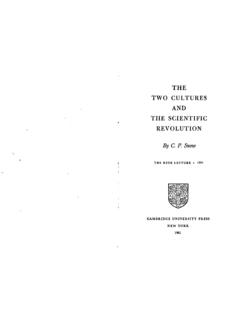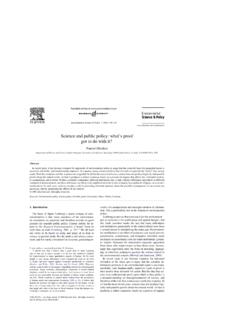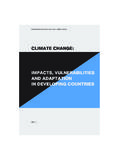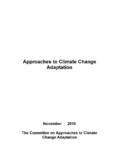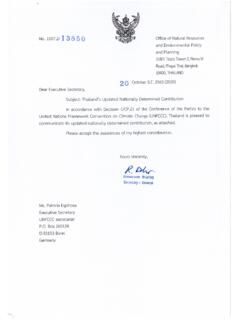Transcription of What Is Climate Change? - University of Colorado Boulder
1 PERSPECTIVES. ROGER A. PIELKE, JR. What Is Climate change ? Believe it or not, the Framework their differing definitions of cli- Convention on Climate change mate change . The FCCC defines (FCCC), focused on international Incompatibility Climate change as a change of cli- policy, and the Intergovernmental mate that is attributed directly or Panel on Climate change (IPCC), between the indirectly to human activity, that focused on scientific assessments definitions used by alters the composition of the global in support of the FCCC, use dif- atmosphere, and that is in addition ferent definitions of Climate science and policy to natural Climate variability over change . The two definitions are organizations is comparable time periods. By con- not compatible, certainly not po- trast, the IPCC defines Climate litically and perhaps not even sci- an obstacle to change broadly as any change in entifically.
2 This lack of coherence effective action. Climate over time whether due to has contributed to the current in- natural variability or as a result of ternational stalemate on Climate human activity. These different policy, a stalemate that matters be- definitions have practical implica- cause Climate change is real and tions for decisions about policy re- actions are needed to improve en- the FCCC in 1997, would ever sponses such as adaptation. They ergy policies and to reduce the vul- come into force. The protocol re- also set the stage for endless politi- nerability of people and ecosys- quires ratification from countries cized debate. tems to Climate effects. whose 1990 greenhouse gas emis- For decades, the options avail- The latest attempt to move cli- sions total 55 percent of the global able to deal with Climate change mate policy forward was the Ninth total. This level will not be reached have been clear: We can act to mit- Conference of Parties to the FCCC, as long as countries with signifi- igate the future effects of Climate held December 1 to 12, 2003, in cant emissions (including the change by addressing the factors Milan, Italy, which took place amid United States and, thus far, Russia) that cause changes in Climate , and uncertainty about whether the refuse to ratify the protocol.
3 Not we can adapt to changes in Climate Kyoto Protocol, negotiated under surprisingly, Climate policy experts by addressing the factors that make have begun to look beyond the society and the environment vul- Kyoto Protocol to the next stage of nerable to the effects of Climate . international Climate policy. Mitigation policies focus on either Roger A. Pielke, Jr. Looking beyond Kyoto, if cli- controlling the emissions of green- ) is director of the Center for Science and Technology Policy Research mate policy is to move past the house gases or capturing and se- at the University of Colorado in Boulder , present stalemate, leaders of the questering those emissions. Adap- Colorado . FCCC and IPCC must address tation policies focus on taking SUMMER 2004 1. steps to make social and environ- be prevented by mitigation strate- to the extent that they lead to mental systems more resilient to gies.
4 Under the logic of the FCCC greater resilience of communities the effects of Climate . Effective cli- definition of Climate change , adap- and ecosystems to Climate change , mate policy will necessarily require tation represents a cost of Climate variability, and particular weather a combination of mitigation and change , and other benefits of these phenomena. adaptation policies. However, cli- adaptive measures are not counted. From the restricted perspec- mate policy has for the past decade This odd result may seem like tive of the FCCC, it makes sense to reflected a bias against adaptation, a peculiarity of accounting, but it is look at adaptation and mitigation in large part due to the differing exactly how one IPCC report dis- as opposing strategies rather than definitions of Climate change . cussed Climate policy alternatives, as complements and to recommend The bias against adaptation is and thus it has practical conse- adaptive responses only to the ex- reflected in the schizophrenic atti- quences for how policymakers tent that proposed mitigation strate- tude that the IPCC has taken to- think about the costs and benefits gies will be unable to prevent ward the definition of Climate of alternative courses of action (see changes in Climate in the near fu- change .)
5 Its working group on sci- IPCC Second Assessment Synthe- ture. From the perspective of adap- ence prefers (and indeed devel- sis of Scientific-Technical Infor- tation, the FCCC approach serves oped) the broad IPCC definition. mation relevant to interpreting Ar- as a set of blinders, directing at- The working group on economics ticle 2 of the UN Framework tention away from adaptation mea- prefers the FCCC definition; and Convention on Climate change at sures that make sense under any the working group on impacts, scenario of future Climate . In the adaptation, and vulnerability uses ). The IPCC report discusses face of the obvious limitations of both definitions. One result of this mitigation policies in terms of both mitigation-only policies, reconcil- schizophrenia is an implicit bias costs and benefits but discusses ing the different definitions of cli- against adaptation policies in the adaptation policies only in terms mate change becomes more im- IPCC reports, and by extension, in of their costs.
6 It is only logical that portant as nations around the world policy discussions. As the limita- a policy that offers benefits would necessarily move toward a greater tions of mitigation-only approaches be preferred to a policy with only emphasis on adaptation. become apparent, policymaking costs. necessarily has turned toward The bias against adaptation Why it matters adaptation, but this has generated occurs despite the fact that adap- The narrow FCCC definition en- political tensions. tation policies make sense because courages passionate arguments not Under the FCCC definition, the world is already committed to only about whether Climate change adaptation refers only to new ac- some degree of Climate change and is natural or human-caused, but tions in response to Climate many communities are ill prepared whether observed or projected changes that are attributed to for any change .
7 Many, if not most, changes rise to the level of dan- greenhouse gas emissions. It does adaptive measures would make gerous interference in the Climate not refer to improving adaptation sense even if there were no green- system. The goal of the FCCC is to Climate variability or change that house gas-related Climate change . to take actions that prevent dan- are not attributed to greenhouse Under the logic of the FCCC defi- gerous interference in the Climate gas emissions. From the perspec- nition of Climate change , there is system. In the jargon of the Climate tive of the FCCC definition, with- exceedingly little room for efforts science community, identification out the increasing greenhouse to reduce societal or ecological of Climate change resulting from gases, Climate would not change , vulnerability to Climate variability greenhouse gas emissions is called and the new adaptive measures and changes that are the result of detection and attribution.
8 Under would therefore be unnecessary. It factors other than greenhouse the FCCC, without detection and follows that these new adaptations gases. From the broader IPCC per- attribution, or an expectation of fu- represent costs that would be un- spective on Climate change , adap- ture detection and attribution, of necessary if Climate change could tation policies also have benefits Climate changes that result in dan- 2 ISSUES IN SCIENCE AND TECHNOLOGY. PERSPECTIVES. gerous interference there is no vincing. And clearly it sets very doesn't go ahead, years of hard- reason to act. In a very real sense, serious brakes on economic won agreements will be placed in action under the FCCC is neces- growth, which do not look justi- jeopardy, and meanwhile the cli- sarily based on claims of scientific fied. The Bush administration mate continues to change . In this certainty, whereas inaction is based used a similar logic to explain its manner, science becomes irrevo- on claims of uncertainty.
9 March 2001 decision to with- cably politicized, as scientific de- But Climate change is about drawal from the Kyoto Protocol: bate becomes indistinguishable much more than perceptions of sci- .. we must be very careful not from the political debate. entific certainty or uncertainty. As to take actions that could harm This helps to explain why all Margot Wallstr m, the European consumers. This is especially true parties in the current Climate de- commissioner for the environment, given the incomplete state of sci- bate pay so much attention to cer- told The Independent in 2001 in entific knowledge of the causes of, tainty (or perceptions of a lack response to President George and solutions to, global Climate thereof) in Climate science as a jus- Bush's announcement that the change . The FCCC definition of tification for or against the Kyoto United States would pull out of the Climate change fosters debating cli- Protocol.
10 Because it requires de- Kyoto Protocol, Climate change is mate policy in terms of science tection and attribution of Climate not a simple environmental issue and thus encourages the mapping change leading to dangerous in- where you can say it is an issue of established political interests terference, the FCCC definition where the scientists are not unani- onto science. of Climate change focuses atten- mous. This is about international A February 2003 article in The tion on the science of Climate relations; this is about economy, Guardian relates details of the cli- change as the trigger for action and about trying to create a level play- mate policy debate in Russia that directs attention away from dis- ing field for big businesses show how the present approach cussion of energy and Climate poli- throughout the world. You have to fosters the politicization of science.


